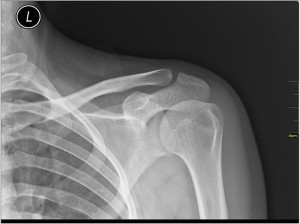
Have you been experiencing dull, aching pain in your shoulder? Is it increasingly more difficult to move and function well? You may be suffering from the first stages of Frozen Shoulder Syndrome. Formally termed Adhesive Capsulitis, patients with frozen shoulder exhibit progressively worsening pain and stiffness in the joint, causing immobility.
While the cause of frozen shoulder is not completely understood, diabetics are ten times more likely to get frozen shoulder than the general population. It is also most common in people between the ages of 40 and 60, and occurs in women more often than men. Some additional medical conditions associated with frozen shoulder include thyroid impairments, Parkinson’s disease, and cardiac conditions however, it can also occur due to immobilization after surgery, a fracture, or other injury.
The great news is that more than 90% of patients improve with non-surgical options such as over the counter medications, steroid injections and physical therapy. When those treatments fail, surgery may be an option to consider. The surgical methods often include manipulation under anesthesia and shoulder arthroscopy.
The key to good outcomes is seeing your physician early and being diagnosed properly. Frozen shoulder is often misdiagnosed for tendonitis. While both are associated with pain, frozen shoulder has the additional component of stiffness, where tendonitis generally does not. Prompt treatment helps reduce further loss of mobility and pain, so seeking medical attention early is an important component of treatment.
If you have further questions regarding frozen shoulder, please feel free to contact Dr. Amaryllis Scott’s office at (509)466-6393.
Guest writer: Amaryllis Scott, MD of OSC Premier Bone and Joint Surgeons. Fellowship Trained, Dr. Amaryllis Scott, is an Orthopaedic Surgeon, specializing in sports medicine. Dr. Scott is highly trained and educated in treating patients with all types of shoulder and knee problems, from simple sprains to severe arthritis of the shoulder and complex ligament ruptures of the knee.






